Workers’ rights group protests UK contracts: VF Corporation responds to students’ concerns
March 4, 2015
By Anne Halliwell
ahalliwell@kykernel.com
Nearly all of the plastic seats in Student Center room 211 were full Tuesday night as students listened to Kalpona Akter, the executive director of Bangladesh’s Center for Worker Solidarity, translate the story of 18-year-old Mahinur Begum.
Begum worked long days for little pay at the Rana Plaza Factory before she was injured and buried in the factory’s collapse in 2013.
The collapse and subsequent creation of the Bangladesh Accord for Fire and Building Safety, which has been endorsed by the Worker Rights Consortium, is the focus of United Students Against Sweatshops this year.
USAS protests the university’s contract with the VF Corporation, a clothing manufacturing company that supplies some apparel in the UK bookstore.
But VF spokesman Craig Hodges said USAS’ focus is misplaced.
The VF Corporation is a founding member of the Alliance for Bangladesh Worker Safety, which Hodges said also works toward improving conditions for workers.
The accord, Hodges said, incorporated mainly European companies. The alliance, though, involved more American companies with which the VF Corporation already worked.
“It was our thought that if we partnered with the partners we already knew well … we could already start making progress on the ground,” Hodges said.
Hodges added that the alliance and the accord already work closely together and even share data like inspection reports.
Autumn Murphy, a USAS member, said the main difference between the accord and the alliance is that the alliance is not legally binding.
Having employers sign a legally binding accord, the history and English senior said, should ensure that factories are fixed in a timely manner, which should prevent accidents.
Begum said that on the day of the Rana Plaza collapse, she was buried under machinery and concrete from the building for almost 18 hours before rescuers were able to dig her out.
Akter said that the factory collapse, and others like it since 1990, could have been prevented with proper inspections and worker input.
“I will ask you, please, be with us and ask your administrators to do the right thing,” Akter said.
The VF Corporation has not sourced collegiate apparel in Bangladesh since 2013, Hodges said.
He added that JanSport, a brand owned by the corporation that is referenced in USAS’ press releases, has never manufactured in Bangladesh.
VF does manufacture other apparel in Bangladesh, Hodges said, but “nothing affiliated with college logos or collegiate apparel.”
But USAS member Amelia Baylon said the location of VF’s sourcing doesn’t matter — human rights violations can happen anywhere.
































































































































































